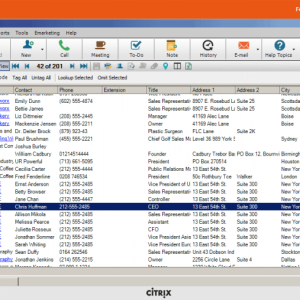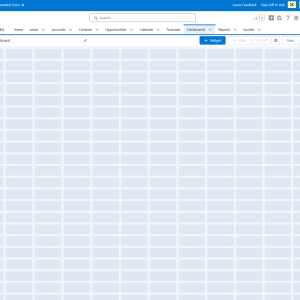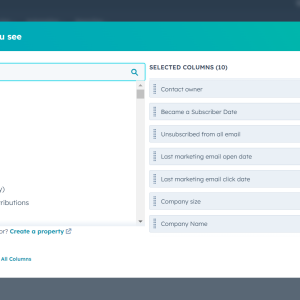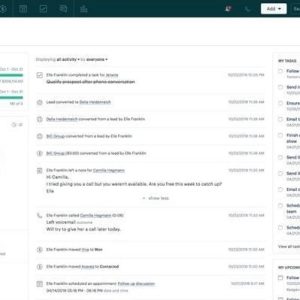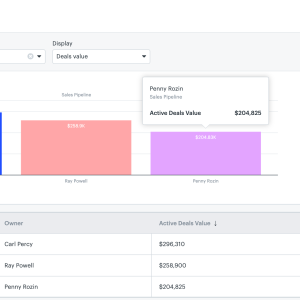In the fast-paced and competitive business landscape of 2023, small businesses face numerous challenges in managing their client base effectively. With the ever-increasing demand for personalized and efficient customer service, it has become crucial for small businesses to invest in client management software that can streamline their operations and enhance customer satisfaction. In this article, we will explore the best client management software options available for small businesses in 2023, taking into account their features, affordability, and ease of use. Whether you are a startup or an established small business, finding the right client management software can significantly boost your productivity and help you stay ahead in a highly competitive market.
Our research shows that Zoho CRM is the best client management software thanks to its robust analytic tools, solid lead conversion features, and its many integrations with other first- and third-party platforms. Freshsales Suite is also a good option if you need an easy-to-use platform, and monday.com is your best bet for some serious customizability.
You are viewing: The Best Client Management Software for Small Business in 2023
The platforms we’ll compare in this guide are some of the best when it comes to building, cultivating, and maintaining relationships with your clients. We’ve compared them in a wide variety of categories to make sure you have the most pertinent information to make your decision. Be sure to check out our CRM comparison page for more information about the best providers. Here are our top three:
Zoho CRM – Best overall client management software
Freshsales Suite CRM – Easiest software to use
monday.com – Best for customization
These are the providers we recommend based on our research. Clicking on the links will take you to the provider’s website.
Top Client Management Software for Businesses
The best CRM for client management is largely going to depend on what you need it for. Each of these platforms is offers different features at different price points, so keep scrolling to learn more about these providers with some in-depth reviews.
- Zoho CRM – Best overall client management software
- Freshsales Suite CRM – Easiest software to use
- monday.com – Best for customization
- Zendesk Sell – Good for sales teams
- HubSpot CRM – Best free client management software
Zoho CRM – Best overall client management software
You’ll find Zoho CRM at the top of a lot of CRM ranking lists, because it provides a whole lot of features at a lower price point than competitors like Zendesk and HubSpot, substantially undercutting them when it comes to value.
This CRM integrates with the massive Zoho family of apps and features a lot of third-party integrations to really give it some power to become an all-in-one hub.
For client management specific, Zoho CRM scored highly on important categories like lead conversion, as well as data and reports, in which Zoho CRM received a perfect 5 out of 5 score.
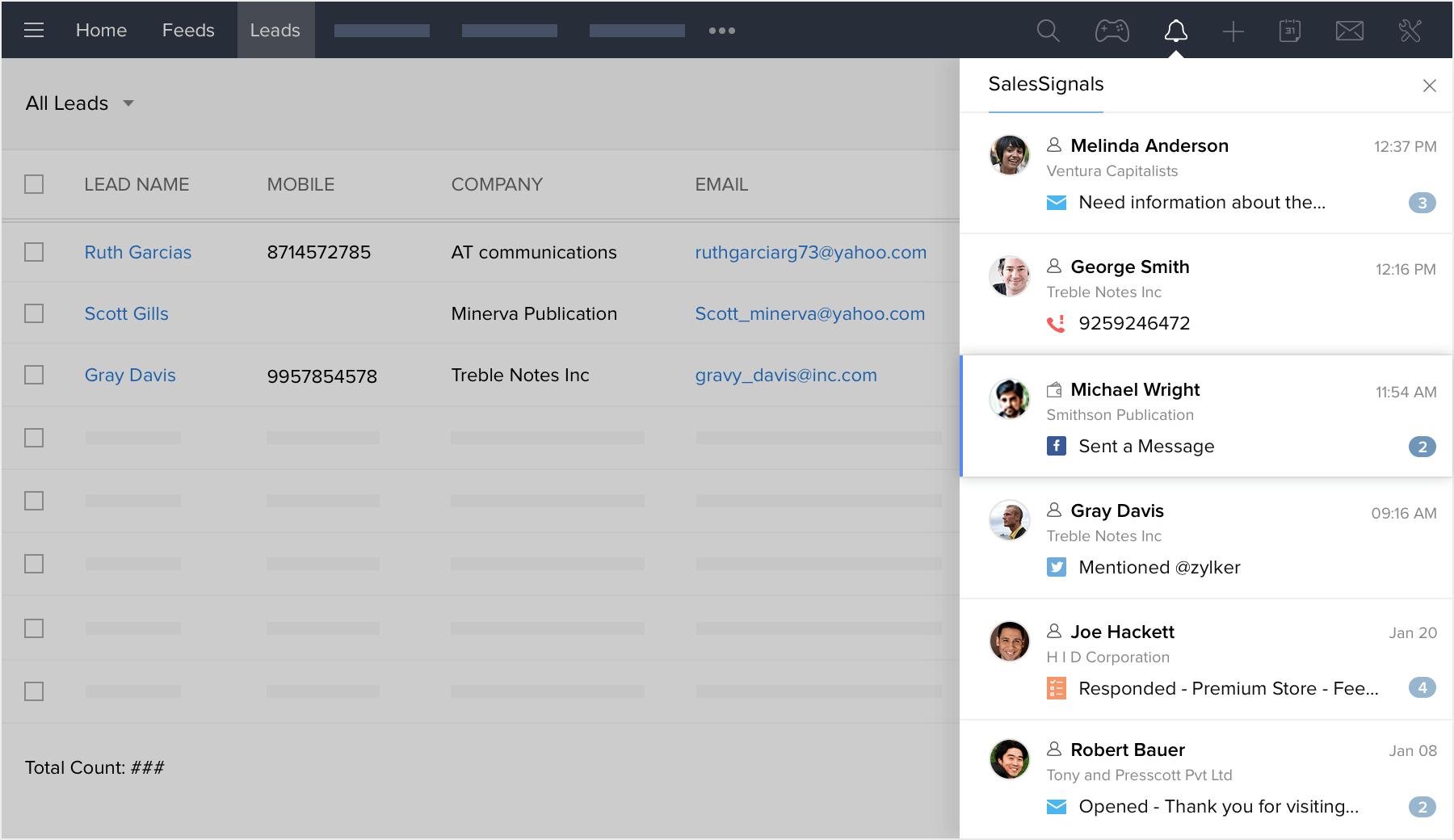
The CRM leads page on Zoho CRM
Image: Duanetoops testing
Simply put, you can’t do much better than Zoho CRM, particularly as it’s the best CRM for small businesses, according to our research.
Zoho CRM pricing
Zoho CRM offers five different pricing plans: Standard, Professional, Enterprise, Ultimate, and Plus. Zoho CRM also has a basic free plan with lots of limitations, but it doesn’t cost anything.
The Standard plan costs $14 per user, per month, the Professional plan costs $23 per user, per month, the Enterprise plan costs $40 per user, per month, the Ultimate plan costs $52 per user, per month, and the Plus plan costs $57 per user, per month.
Our research found that the Professional plan is the best option for client management, unlocking custom reports and user storage, allowing for more in-depth information about customers to act on.
Check out our Zoho CRM pricing guide for more information
Freshsales Suite – Easiest software to use
As an all-in-one sales and marketing CRM, Freshsales Suite is uniquely positioned to provide excellent client management functionality for businesses. The prices are competitive, the features are plentiful, and the platform is easy to use, even for beginners. In fact, it scored highest in usability, netting a 4.7 out of 5 in our research in the category.
Even better, Freshsales Suite offer built-in VoIP software, which allowing a more seamless way to communicate with clients in the long run.

The contacts page on Freshsales Suite
Image: Duanetoops testing
Where it really shines as far as client management is concerned is that it provides robust analytics for tracking your client progress, including sales forecasting in its most expensive plan. Our researchers also found that it’s scoring was quite comprehensive, providing positive and negative indicators to let you know which ones are ripe for the picking.
Plus, scoring a 3.5 out of 5 for lead communication features, Freshsales Suite has some of the best, beating out even Zoho CRM in the category. This allows it to offer the tools necessary to manage client needs and gain meaningful insights into pain points that may be impeding your pipeline.
Freshsales Suite pricing
Freshsales Suite offers three different pricing plans: Growth, Pro, and Enterprise. It also offers a free plan that will let you test out the platform before making a financial commitment.
The Growth plan costs $15 per user, per month, the Pro plan costs $39 per user, per month, and the Enterprise plan costs $69 per user, per month.
See more : 12 Benefits of CRM Software Every Business Should Know
Our research has found that the Growth plan is the best option for client management, as it costs far less than a lot of other providers and still unlocks the majority of features you need, like lead scoring and custom automation builders.
monday.com – Best for customization
Customizability factors in greatly to whether or not a CRM is good for client management, and you can’t get much better than monday.com. This platform is built on customizability, offering plenty of ways to change it to fit your particular business needs. The data and reports are excellent too, providing custom reports across all plans.

The leads dashboard on monday CRM
Image: Duanetoops testing
The features that keeps monday.com from being at the top of the list is the lead conversion tools, which are lacking a bit. Having scored only a 3 out of 5 in our research in this category, monday.com is more geared towards organizing your information rather than acting on it too much.
Still, if you’ve got a specific need for a CRM in terms of client management, monday.com can likely help you mold the platform to those needs. In fact, our researchers found it to be one of the best in terms of customization, because it allows you to add extra columns in dashboards and tables to accommodate additional information.
If it sounds like the provider for you and you’d like to find out a bit more about it, check out our monday.com CRM review.
monday.com pricing
The CRM monday.com offers four different pricing plans: Basic, Standard, Pro, and Enterprise. It also offers a simple free plan that is pretty limited but can get you started on a smaller budget.
The Basic plan costs $10 per user, per month, the Standard plan costs $14 per user, per month, and the Pro plan costs $24 per user, per month. Each plan requires a minimum number of three users, so $30 per month is your minimum possible cost. The Enterprise plan does not have publicly available pricing, so you’ll have to reach out to monday.com for more information.
Our research found that the Pro plan is the best plan for client management software, primarily because it unlocks some analytical tools, like sales forecasts, so you can more effectively convert leads.
It’s worth noting that, while monday.com is more affordable than options like Zoho CRM and Freshsales Suite on a per user basis, the platform requires a minimum of three users across all its plans, so you’ll be paying at least $24 per month no matter what. Subsequently, those other CRMs might be better if you only need a single user.
Zendesk Sell – Good for sales teams
As you can likely guess from the name, Zendesk Sell is a sales-focused CRM that offers a sleek, intuitive interface, making it easy to operate for everyone in your company. The prices can get a bit high, but the lower priced plans still offer lots of functionality for your business.

The contact database from Zendesk Sell
Image: Duanetoops testing
In regard to client management, Zendesk Sell’s biggest selling point is its many organization and management features, which can encourage your sales team to be more productive. From task management tools to team KPIs, you’ll be able to keep track of it all, enabling your team to more effectively stay in touch with clients.
Zendesk Sell pricing
Zendesk Sell offers four different pricing plans: Team, Growth, Professional, and Enterprise.
The Team plan costs $19 per user, per month, the Growth plan costs $55 per user, per month, the Professional plan costs $115 per user, per month, and the Enterprise plan costs $169 per user, per month.
Our research shows that the Growth plan is best for client management, as it isn’t too expensive and still adds API access, so you can customize the platform to your particular client management needs.
Zendesk Sell is far more expensive than the other platforms on this list, like Zoho CRM and monday.com, but it still offers a lot. If you’re exclusively looking for sales features, it could be a good move, but Zoho CRM is just a better value when it comes to all-in-one CRM hubs.
Check out our Zendesk pricing guide for more information
HubSpot CRM – Best free client management software
If you’re in the market for a free CRM that can actually get some work done, HubSpot is what you’re looking for. While it offers a lot of pricing plans, some that can get pretty expensive, HubSpot offers a great free plan that doesn’t skimp too much on the features you need for client management.
In fact, our researchers found that HubSpot offers some excellent client-facing features, including a personalized marketing communications experience for brand fans and customers that will engage them for future interactions.

The contacts page on HubSpot free
Image: Duanetoops testing
Obviously, you’ll miss out on some key features like lead scoring, but HubSpot still provides a customizable sales pipeline and quote proposal management at no cost, as well as the ability to view revenue data. Understandably, you won’t get all the organization and management features, but for free, you could do a lot worse.
From a value standpoint, we still have to give the edge to Zoho CRM, simply because it offers so many features for such a reasonable price. Still, if the budget is tight and you can get by on the basic features, we understand that a free plan from HubSpot is hard to beat.
HubSpot pricing
HubSpot is more geared towards larger companies, with pricing plans that get pretty expensive. However, the CRM offers a surprisingly robust free plan that offers excellent tools for client management at no cost to users. We’d recommend sticking to the HubSpot free plan if you’re a smaller business.
See more : 8 Best Customer Retention Strategies to Boost Loyalty
If you do want to scale with the platform, though, HubSpot offers three different hubs for sales, service, and marketing, which each have three pricing plans within them. Take a look at the pricing table below to learn more.
Check out our HubSpot pricing guide for more information
What to Look for in Client Management Software
Clearly, you’re in the market for client management software, which is why it’s so important to understand exactly what kind of features are important to this kind of software. In our research, we looked at a few key features that you’ll want to investigate when it comes to making the right decision for your business. Here are the key features of client management software:
- Lead conversion – These kinds of features are useful for turning prospects into clients. Our research measured whether providers can track client relationships with customizable sales pipelines, lead scoring, and comprehensive quoting.
- Data and analytics – Reporting tools are key when it comes to seeing the big picture of your client relationships. The right platform will allow you to view your clients in terms of revenue generated.
- Third party integrations – The ability for a platform to integrate with communication tools like VoIP and web conferencing software will make a big difference when it comes to keeping in touch with your clients in the long run.
- Organization tools – These features will enable you to stay on top of client communication with tools like unified inboxes, team calendars, and task management functionality.
On top of all that, you’ll obviously want to consider factors like price and ease of use, because the last thing you want is a software that is costing you more money than its making or causing headaches for other employees.
Why Do Businesses Need Client Management Software?
If you’ve made it this far, you likely know that you need client management software, but you may not be 100% sure why. Fortunately, we can explain all the benefits of client management software for businesses, so you know exactly what you’re getting in to and why.
First off, client management software allows users to analyze data and understand clients better, facilitating better campaigns. Additionally, it allows you to segment your customer base to provide more personalized experience across the board.
Client management software also typically provides features that can help you set up your sales pipeline with advanced lead scoring, so you know where your most likely sales are coming from. On top of that, keeping track of client histories facilitates better retention rates and empowers your team to more effectively solve problems and make sales.
Overall, though, client management is about improving the client experience. And considering 86% of clients are willing to pay more for a better experience, it’s safe to say this kind of software can make a big impact on your business.
Expert tip
A CRM is vital for any sales team to properly manage and convert pipeline. The analytics provide management with an arsenal of data to pinpoint bottlenecks in the sales cycle and allows them to optimize process to ensure their teams are being as efficient as possible.

We take our impartial research and analysis seriously, so you can have complete confidence that we’re giving you the clearest, most useful recommendations.
After conducting an initial exploration to identify the most relevant, popular, and established tools in the market, we put them through their paces with hands-on testing to see their real strengths and weaknesses. In this case, we put 13 CRM systems to the test across 84 areas of investigation.
Based on years of market and user needs research, we’ve established a CRM testing methodology that scores each product in six main categories of investigation and 13 subcategories; this covers everything from the available features and scalability capacity to the product’s value for money, and much more.
Our main testing categories for CRM systems are:
Features: the functionalities and capabilities provided by the CRM software, such as contact management, lead and opportunity tracking, and task and activity management.
Help and Support: the resources and assistance available to users when they encounter issues or require guidance while using the CRM software.
Customisation: the ability to tailor the CRM software to suit the specific needs and processes of the organization, e.g. customizing fields, layouts, and workflows.
Scalability: the ability of the CRM software to accommodate the growth and changing needs of the organization, such as the capacity to handle a growing customer database.
Price: the cost associated with using the CRM software. It includes factors such as licensing fees, subscription plans, and additional charges for add-on modules or features.
Team Structure – Sales CRM: determining if a platform makes it easier to manage large sales teams, including team dashboards, team hierarchies, and team inboxes.
Usability – Small Business CRM: assessing the simplicity of the interface, the ease of navigating through menus and options, and the overall user experience.
When it comes to calculating a product’s final score, not all testing areas are weighted evenly, as we know some aspects matter more to our readers than others, which are merely “nice to have.” After hundreds of hours, our process is complete, and the results should ensure you can find the best solution for your needs.
At Duanetoops, we have a number of full time in-house researchers, who re-run this testing process regularly, to ensure our results remain reflective of the present day
Learn more about our research.
That’s a wrap on “ The Best Client Management Software for Small Business in 2023 ” We hope you’ve found a trove of useful insights and fresh perspectives. Your opinions and ideas matter to us—join the conversation below and share your take! Hungry for more tech insights? Dive into our diverse collection of articles where innovation meets practicality. Discover More CRM Softwares.
Stay in the loop with the latest in AI and tech – your journey into the digital future continues at duanetoops.com.
#Client #Management #Software #Small #Business
Source: https://duanetoops.com
Category: CRM
